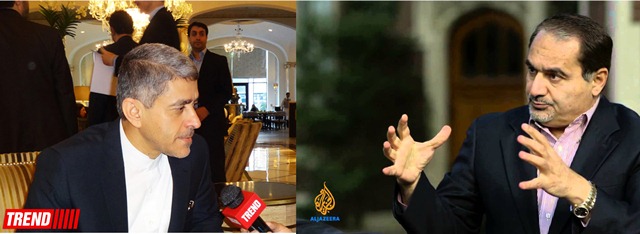In Baku, Azerbaijan, Iran’s Economy and Finance Minister Ali Tayebnia has told a Website Iran’s current problems can also be an opportunity for “economic reform”.

From Left: Iran’s Finance and Economy Minister Alli Tayebnia, and former Iranian spokesman for the Nuclear negotiations team, Syed Hossein Mousavian
By TZ Business News Staff.
The US Government Public Broadcasting Service (PBS) Television Station has broadcast a statement in which US President Barak Obama softens his stand against Iran.
The US Congress passed a bill during the week ending January 31, 2015 threatening the US will toughen sanctions against Iran if nuclear negotiations fail to achieve an agreement the US likes by the end of June 2015.
The US president told Congress putting sanctions at this moment in time would all but guarantee that diplomacy fails.
The former spokesman for the Iranian nuclear negotiations team, Syed Hossein Mousavian, who had at one time contested for the position of President of Iran, told PBS in a program aired during the week Iran was co-operating with the US.
To prove co-operation exists, Mousavian said Iran secretly co-operated with the US and Russia to facilitate destruction of weapons of mass destruction in Syria. “ There was a trilateral secret co-operation between Tehran, Washington and Moscow which led to destruction of chemical weapons in Syria,” the Iranian politician said.
In Baku, Azerbaijan, the Journalists Temkin Jafarov and Fatih Karimov report in the Website Trend.az that Iran’s Economy and Finance Minister has said fluctuations in oil price can certainly affect the Iranian economy in different ways, but he believes it is also an opportunity for economic reform.
The Economy and Finance Minister Ali Tayebnia told Trend Jan.29 that “one of them (affects of plunging oil price) is the national budget and government revenues. Another one is the foreign trade balance and foreign currency issues,” he said.
OPEC oil basket price decreased from $108/barrel in mid-June 2014 to the $43.88/barrel on Jan.29. The latest report by World Bank, released Jan.29, estimated that Iran’s oil export revenues would declines to $23 billion in 2015 from its peak of $120 billion in 2011/12.
Of course, Iran’s oil exports decreased from 2.2 million barrels per day (mb/d) in 2011, before imposing western sanctions, to 1.24 mb/d in 2014. However, the price of oil has dropped by 60 percent during 2015, compared to 2011.
The World Bank says if Iran and P5+1 (the United Nations Security Council and Germany) couldn’t reach a comprehensive deal to lift bans on Iran’s oil exports, the country’s GDP growth would decrease from 1.5 percent in 2012 to zero in 2015 and the economy would continue to shrink.
Despite the affects of plunging oil price, Tayyebnia says, “we decided to change this threat into an opportunity and take advantage of the situation to reduce the national economy’s reliance on oil revenues”.
Iran decreased the reliance of next fiscal year’s budget on oil export revenues from about 40 percent to 31 percent. However, according to the World Bank, oil makes up about 80 percent of total export earnings and 50 to 60 percent of government revenues.
On the other hand, Iranian government pays $80 billion dollar as fuel subsides annually, but decreasing the fuel prices due to the plunge in oil price decreased the price gap inside and outside the country.
Iranian minister said, “we are obliged based on the law to fill the gap between prices of oil products in the domestic market and in the international market. This is a welcome opportunity, because regional prices have decreased. This can pave the way for us to materialize objectives of the law,” he added.
The International Monetary Fund put Iran’s nominal GDP for 2014 at $406 billion.



